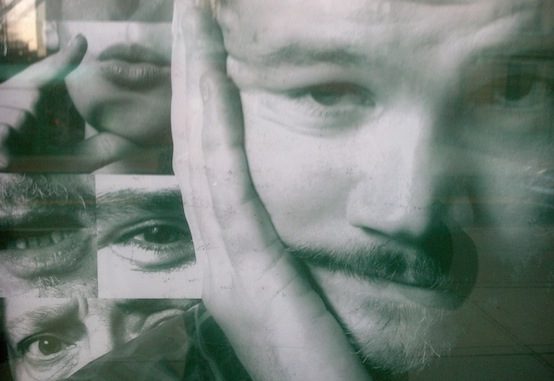Dyscommunication: “Tribes” at DC’s Studio Theatre

If you couldn’t understand what your family was saying, would you understand them better or worse?
Nina Raines’s “Tribes” opens with four Britons hurling abuse at each other around the kitchen table. I think it’s supposed to be funny, but it’s mostly just crass and painful: Mom, Dad, brother and sister describing one another’s passions, hopes, beliefs, and sex lives in the most contemptuous terms possible. The fifth member of the family is deaf and yeah, you do feel that perhaps he’s the lucky one.
As the play moves forward, the younger characters get shades and nuance. (The parents, and especially the cartoonishly self-centered father, remain pretty much the same.) Daniel (Richard Gallagher), the hearing son, shows flashes of haunted vulnerability which reveal a gulf of misery under cover of vituperation. The entire family has raised Billy (James Caverly, who starts off with a beatific smile which is clearly at least partly a mask or role) to read lips rather than to sign. They’ve developed an ideological resistance to anything which smacks of Deaf culture.
They genuinely believe they’re protecting Billy, but they’re also terrified of losing their beloved son and brother to a culture which can promise him a kind of belonging they can’t offer. When that masky smile finally slips and Billy says that they view him as the family mascot, the audience can tell that it’s not true: If anything, he’s the family conscience, the only one they allow to be good, the only one they’ll openly love. Of course, he’s also the only one they never need to listen to.
When the play begins, the family is all trapped together. The hearing children, Daniel and Ruth, have retreated to the family home after a series of romantic and professional defeats in the outside world. (“I feel like a bonsai tree!” Ruth yells, in a line which got big, empathetic laughs.) Billy never left, has never had a job or a girlfriend. One of the major themes of the play is the fact that belonging is rarely chosen; you don’t get to pick the elements which make up your identity, the ties which bind. You can try to leave—and seriously, Daniel at least should do everything in his power to get out of his parents’ house, because they’re actively damaging his psyche; this isn’t a play about the comforts of home—but you will eventually have to return, if only to give an account of yourself.
There are some terrific little moments (the play’s humor eventually does become actually funny), often involving how much impromptu “sign” this resolutely anti-sign-language family uses. There are tough, basically unanswerable questions about how language shapes us and separates us from others: As Billy’s new girlfriend goes deaf, she wonders if she’s losing the ability to understand nuances and ambiguities which can’t be expressed in sign.
There are very pointed, recognizable portrayals of how privilege works, how people rationalize their advantages over others and reject other people’s perspectives. My favorite of those moments was when Billy’s father badgers the girlfriend to tell him all the human qualities that are lacking in sign language. This moment works so well because his question is inherently important—but it’s a poignant source of pain, and he’s treating it as a debating tactic and a stepladder to the moral high ground. Please, tell us about your deficiencies as a person! And then Daniel jumps in and, sincerely, makes it explicit: “We don’t want to hear what sign does well.” “Don’t tell us the hype,” the father snaps—an especially good line given that Billy has just been hyping and soft-soaping sign, and yet the family dismisses every possible advantage of sign as “hype.” You can say anything you like, as long as you say we’re better.
So there’s a lot going on in this play. In the end there’s too much, too many metaphors for different angles on the same questions. For example, Daniel not only hears voices (which his father blames on pot) but also stammers. Especially since the stammer is only introduced toward the end, this just feels like too many kinds of communication problem. There’s a subplot about Billy’s lip reading for the police which has several obvious purposes but is introduced too late and doesn’t quite do enough to justify the additional complications it adds. (The fact that its purposes and its metaphorical weight are obvious also weakens the play.) And the play’s ending feels a bit pat and “written”: I know I say this all the time, but the play ends right when things are about to get really difficult, and that seems like a cop-out.
“Tribes” raises sharp, relatable questions: Do we understand other people more than we’re willing to admit, or less? Is there such a thing as a community or even a family, or is everyone’s experience so unique and conflicted that what I think our family is bears very little relation to what you think our family is? Does belonging make life easier or harder? Can love truly appear ambiguous, or are some people just jerks? Am I ever going to get out of this place? It portrays the rules of a family—whom they’re allowed to love vocally and explicitly, and whom they have to backhand and defend against—and it’s timely and tough. If I thought it came across a bit overworked, well… maybe I just didn’t get it.